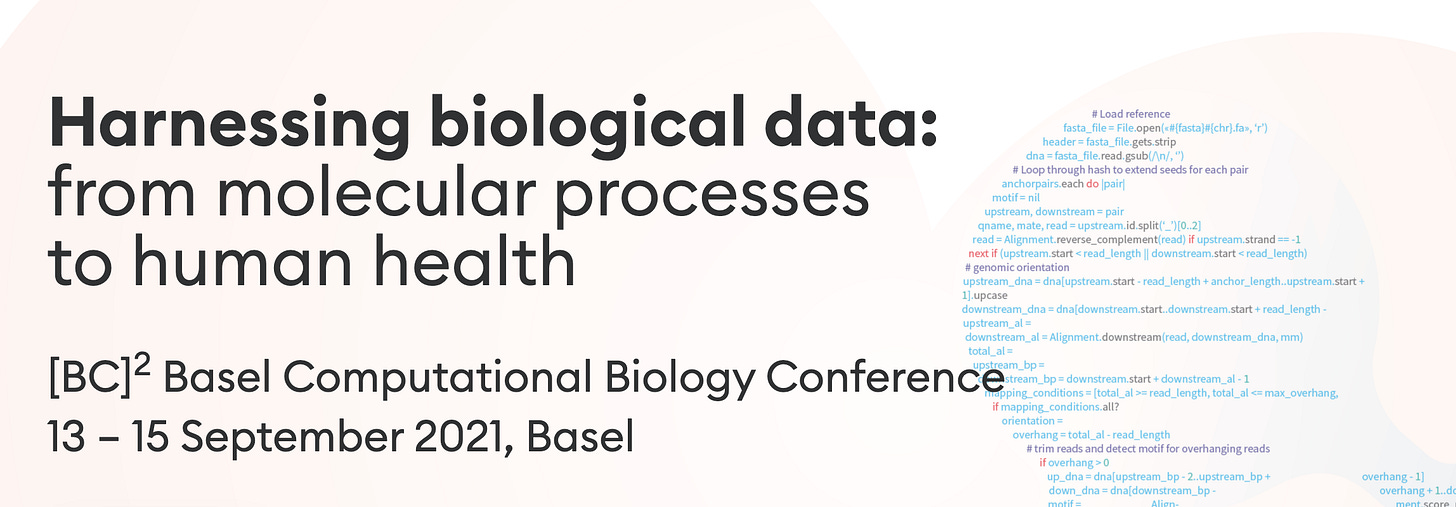Online Ecology Conferences
Biology Meets Programming: Bioinformatics for Beginners
Are you interested in learning how to program (in Python) within a scientific setting? This course will cover algorithms for solving various biological problems along with a handful of programming challenges helping you implement these algorithms in Python.
The Biodiversity Conference 2021
Date: September 15th - 17th
Abstract Submission Deadline: May 28th
Conference Theme
Indigenous Stewardship, Our Biodiversity Assets, Trends and Conditions, Threats and Their Impact, Restoration and Conservation and Technology and Innovation.
Society for Open Reliable and Transparent Ecology and Evolutionary Conference 2021
Date: July 12th - 14th
Conference Theme
We want to facilitate lively exchanges of ideas, and so the following three event types will be the heart of the conference:
Unconferences - Facilitated discussions of ideas for how to make ecology, evolutionary biology, and related disciplines more open, reliable, and transparent. Facilitation involves moderating the conversation with ideas and examples, but there are no formal presentations.
Hackathons - Group projects with well-defined goals (papers, techniques, software, protocols, organizations, etc.).
Workshops - Facilitators will teach tools for implementing open, reliable, and transparent practices.
SORTEE is a service organization which brings together researchers working to improve reliability and transparency through cultural and institutional changes in ecology, evolutionary biology, and related fields broadly defined. Anyone interested in improving research in these disciplines is welcome to join, regardless of experience. The society is international in scope, membership, and objectives.
How to get a conservation job | Free course
Learn how to get hired as a professional wildlife conservationist with the experts at Conservation Careers.
Designed for students, job-seekers and career-changers in this free course you’ll learn the key to getting started, the mistakes and myths to avoid and the answers to your main questions.
If you chose to enrol, you’ll also get a free eBook ‘how to apply for a conservation job’ along with examples of successful resumes, covers letters and CVs.
Developments in monitoring science
Date: 24th - 25th November
Abstract Submission Deadline: May 31st
Conference Theme
The monitoring of bird populations provides the bedrock for informing conservation priorities and the research and conservation action that arises from these priorities. Whilst traditional field methods underpin the standardized monitoring programmes that have operated in the UK and many other countries, sometimes for decades, rapid recent developments in technology, online communication and statistics are offering many new possibilities that may enable us to improve existing monitoring programmes, and also to extend monitoring efforts to new species, regions and habitats.
Basel Computational Biology Conference
Date: September 13th - 15th
Abstract Submission Deadline: May 16th
Conference Theme
Evolutionary Dynamics and Ecology: Where Organisms, Time and Space Interplay (Session)
Comparative genomic analyses between species, but also within a population of the same species, can illuminate how species evolve, interact with each other and adapt to environmental cues and changes. This session is open to research projects from a wide range of topics: from the development of software and methods to analyse population structures and dynamics, to the phylogenetic inference or the characterization of species’ evolutionary features. To highlight the diversity of life on our planet, research findings from model organisms as well as non-model organisms and populations are welcome.
Topic includes but is not limited to: evo-devo, molecular and experimental evolution, phylogenetics, phylogenomics, comparative genomics, population structure, adaptation, individual-based models, population dynamics, coexistence, cooperation and conflict, multi-species communities, community stability, community diversity






